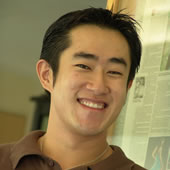Young Children’s Voices in Mathematical Problem Solving
Contributed by Dr Ho Siew Yin and Sng Wei Qin Abbie, from NTUC First Campus, for SingTeach Virtual […]
Read More
In a world where the gap between research and practice is a pertinent concern, Adrian Wong stands out as part of a very important – albeit small – group of teachers who do research while staying grounded in practice. Is there really a way to balance academic theory and real-world teaching? Adrian shares his views in a candid interview with SingTeach.
 It was the nagging desire to “learn more” that led Adrian put his three-year teaching career on hold to work full time as a Research Assistant for the Centre for Research in Pedagogy and Practice (CRPP).
It was the nagging desire to “learn more” that led Adrian put his three-year teaching career on hold to work full time as a Research Assistant for the Centre for Research in Pedagogy and Practice (CRPP).
He worked on a project entitled “Speaking Out: An exploration into how process drama contributes to oracy“, which focused on helping secondary school students develop better verbal skills through drama. After a one-year stint with CRPP, Adrian returns to school once again, teaching O-level Drama and English while pursuing a Master’s degree in Education.
Read on to find out what he has to say about the world of educational research, going back to teaching, and “seeing things in terms of the bigger picture”.
A: When I was doing my Advanced Graduate Diploma in Drama and Drama Education and Master’s in Education, we were encouraged to be reflective about practice and continually think about how theories linked with our practice. It started a thinking process in me. But I found that just attending more courses can be very decontextualised. Without seeing things in context and seeing things from different perspectives, it’s hard for you to really understand it better.
As a teacher, we sometimes didn’t have the mental space to think about what we do and look at things from a third person perspective. This is because of the workload and expectations. Teaching is emotional work and it’s sometimes hard to extricate yourself on a weekly or monthly basis and think critically about what you are doing. As a researcher, I’m in a privileged position where I get to observe, I get to think, I get to link my readings with the practices of the teachers, and I get to look back at myself.
A: I think this will change the way I teach quite dramatically. I’m really excited about working with students again, now that I’ve acquired some vocabulary that will help me talk about and reflect on my own practices in the classroom.
I’ve also learned to be less judgmental. After engaging with theories and things happening all over the world, I began to see things in a different light. I was putting a lot of responsibility upon myself. I always asked myself, “Why am I not teaching better?” or “Why isn’t this class doing better?” Now, I know how to pull myself back and say, “Okay, how can I make this work?”
A: I hope to engage in more research when I finish my Master’s thesis, either for my own practice or research that will benefit the school. I realised that if I were to do research while teaching, it keeps me on my toes. I don’t get too comfortable with my own practice. I don’t forget about the bigger picture and the bigger issues.
I strongly feel that whatever research we do has to be linked to practice. I feel that there really is a need for teachers who are also researchers. This is because we are able to link theory with practice, then go back and rethink our understanding of theory again.
A: I think that teachers who have been exposed to research are a rare breed and can really serve as a bridge between the research and practice. There’s a lot that can be done to help us along. CRPP could provide some structural support like extending resources such as articles, journals, databases; lending mentors who can guide research projects in schools; helping teachers with getting publications done; and co-writing certain articles.
MOE may also want to consider providing teachers with more scope and time for research work. This can be recognised as a significant part of a teacher’s work portfolio. Perhaps teachers who choose to do research shouldn’t need to take a CCA (Co-Curricular Activity) or be so heavily involved administratively. If you want teachers to conduct rigorous and well-designed research, you have to give them the time to get things done. After all, teacher-researchers are still contributing to education.